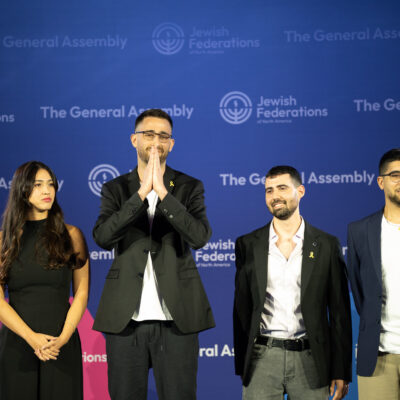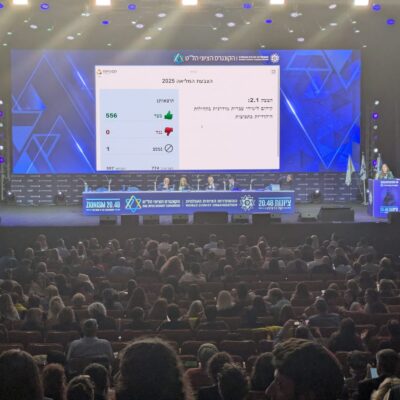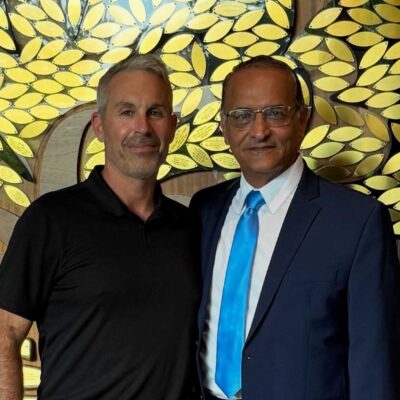Opinion
LEADERSHIP PIPELINE
Jewish leadership, made in Britain
I’m sure I’m not the only adult who continues to find the first “Back to the Future” movie irresistible even after multiple viewings. Watching the lead character’s time-traveling self encounter the people and environments that contributed to who he is in the present day remains a wondrous experience.
During the last year, I had a “Back to the Future” experience of my own. Born and raised in the U.K., I left Britain almost 30 years ago and have been fortunate to live in Israel for the past 20 years. I go back to the U.K. often for business and pleasure, but until now I’ve never been asked to study the settings and circumstances that contributed to who I am today — and who I might have become, had I remained there.

British gap year students on Bnei Akiva's Lehava program in Jerusalem, Israel, in 2015. JNF UK/Facebook
To be less cryptic: About a year ago, United Jewish Israel Appeal (UJIA) and the Jewish Leadership Council (JLC) — two of the U.K.’s premier cross-communal bodies — asked the team at Rosov Consulting to help take stock of Jewish leadership in the U.K. today and to identify the leadership structures and supports that can help the community thrive in the future. Specifically, the study’s goal was to construct a portrait of those who serve as Jewish leaders today or might do so in the future, what has shaped or empowered them, how effective they are perceived to be and how prepared they are for the tasks that lie ahead.
Drawing on my knowledge of Jewish communal and educational leadership development in North America helped me make sense of the place I once called home. It was truly a case of going back to the future — even the familiar was now different. It was a chance to answer the question: “What is distinctive about the Jewish leadership cultivated in Britain?”
Here are some highlights of what our team learned, derived from focus groups and interviews with 48 Jewish professional leaders and volunteers of all ages, including youth leaders, early-career professionals, seasoned leaders and veteran volunteers.
Seed sectors (aka our ‘playing fields of Eton’)
Learning Jewish leadership starts young in the U.K., and they don’t use the terminology of “youth-serving organizations” but rather “youth movements.” This language is not casual: In the U.K., there continues to be a robust network of ideologically driven Jewish organizations led by teens and young adults for their young peers with very little adult input.

There’s much debate within the community about whether these organizations are as robust today as they used to be due to competition from CV-building experiences. Community leaders have also wondered whether the massive expansion of Jewish day schools over the last 30 years has drawn young people away from active participation in extracurricular Jewish frameworks. Our study affirmed that these organizations continue to serve as a rich seedbed of community leadership, building social, cultural and human capital that lasts a lifetime. The Duke of Wellington is supposed to have said that the battle of Waterloo was won on the playing fields of Eton. In a similar vein, youth movements — and, to a lesser extent, Jewish student organizations at university — continue to forge the values, commitments and capacities of the adults who lead the community today and will probably do so tomorrow. To use another British analogy: these organizations are the Jewish community’s crown jewels.
Volunteers and professionals are often both at the same time
At first glance, it seems strange that the foremost Jewish leadership development programs in the U.K., such as the Adam Science Leadership Programme and the Dangoor Senior Leadership Programme, are open to both lay and professional leaders at the same time. In North America, by way of a contrasting example, the Wexner Foundation has operated entirely distinct structures for volunteer and professional development for decades.
The British arrangement does not indicate a lack of clear goals but rather reflects a distinct strength: Typically, the same individuals will, at different points in their lives, serve as both Jewish community professionals and volunteer leaders. Nearly every professional we interviewed currently serves as a trustee of another organization, their professional and volunteer identities intertwined. This does not seem to result in role confusion but rather in much greater empathy for the person on the other side of the board table. It also contributes to much more fluid career trajectories.
Jewish leadership pathways in the U.K. are not unidirectional. Former volunteers take on professional roles, and professionals take up positions outside the Jewish sector but continue to serve as volunteers for Jewish organizations.
A multigenerational ecosystem of leadership
The previous two phenomena contribute to a third: a multigenerational ecosystem of leadership. With about 300,000 Jews living in the U.K. today, the community is not oversupplied with leaders and always needs more capacity. At the same time, those who do serve do so across the span of generations. This is partly because people are invited to take on responsibility at relatively young ages, and partly because former professionals continue to contribute for many years beyond retirement. In a medium-sized community, the networks that connect leaders with one another are thick and tangled: They’re horizontal, thanks to those lifelong youth movement relationships, and they’re also vertical, thanks to connections across members of the same families. Interviewees offered frequent examples of how they were first recruited to participate in activities that an aunt or a parent had been organizing.
For new arrivals in the U.K., the thickness of these horizontal and vertical relationships can make it hard to break into communal leadership. Overall, though, the benefits of those multigenerational relationships outweigh their costs. They cultivate a sense of historical legacy among those who serve today, and an awareness of where one person’s contribution fits into a bigger Jewish communal picture. They help keep the system going and cultivate new leaders.
While these three special features underpin a vibrant communal ecosystem, they can result in challenges, too. It can be hard for young people to transition from the intensity of their youth movement activism, where their identities and roles are closely intertwined, to taking up professional roles in organizations with which they feel less ideologically aligned, the idealist fire of youth hard to sustain. Serving simultaneously in different contexts as a professional and a volunteer leads to burnout; younger professionals complain of being “overvalued.” And as noted above, the thick personal relationships that help transmit Jewish and organizational values across the generations can make it hard for those with divergent values or recent histories in the U.K. to find a place for themselves.
In geopolitical terms, Great Britain is not as “great” as it used to be, but the Jewish community should not feel inferior about its place relative to its North American coreligionists. It has plenty to learn from the practices of Jewish communities in other parts of the world, but Jewish leadership practices made in Britain are not just quaint artifacts. As I have tried to show, they can be a valuable commodity in the global marketplace of ideas.
Alex Pomson is principal and managing director of Rosov Consulting, a firm providing high-quality research, evaluation and insights to Jewish organizations to enable them to make informed decisions and effectively pursue their strategic goals.

 Add EJP on Google
Add EJP on Google









